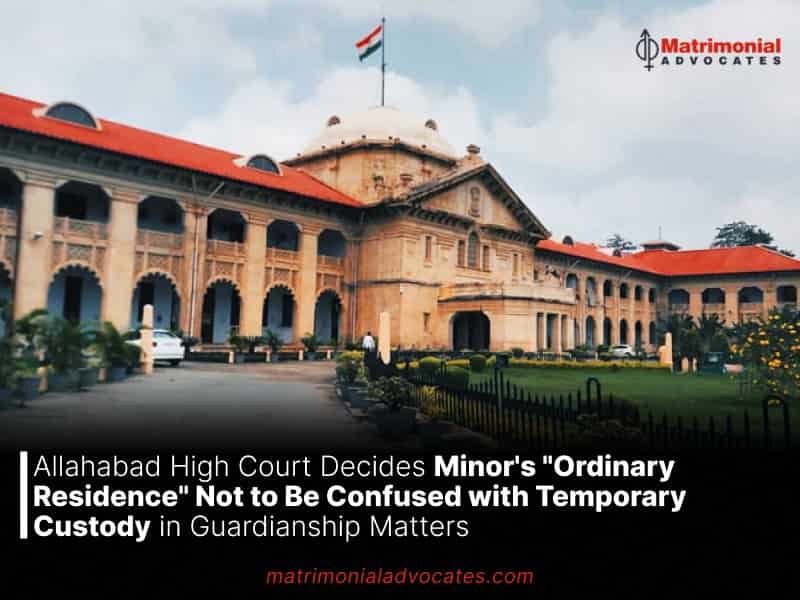
The Allahabad High Court has clarified that within Section 9(1) of the Guardians and Wards Act, 1890, the concept of a minor’s “ordinary residence” excludes any temporary dwelling where the minor might temporarily reside, such as for educational purposes, at the time when a custody application is made under the Act.
Under Section 9(1) of the Guardians and Wards Act, 1890, it is mandated that any application for guardianship concerning a minor must be filed in the District Court having jurisdiction over the area where the minor usually resides. Sub-sections (2) and (3) of Section 9 delineate the jurisdictional aspects concerning applications pertaining to the minor’s assets.
The bench comprising of Justice Vivek Kumar Birla and Justice Syed Qamar Hasan Rizvi held
“a bare perusal of section 9 (1) of the Guardians and Wards Act, 1890 makes it apparent that it is the ordinary place of residence of minor which determines the jurisdiction of the Court for entertaining an application for guardianship of the minor. Such jurisdiction cannot be taken away by temporary residence elsewhere on the date of presentation of the petition. The fact that the minor is found actually residing at the place when the application for the guardianship of the minor is made does not determine the jurisdiction of the Court.”
The Court emphasized that there’s a clear distinction between the minor’s “ordinary residence” and their residence at the time of applying for custody. It stressed that the phrase “where the minor ordinarily resides” is meant to prevent jurisdictional manipulation by moving the minor away from the court’s jurisdiction where the custody application is lodged.
“The purpose of using the expressions “where the minor ordinarily resides” is perhaps to avoid the mischief that minor may be forcibly removed to a distant place, but still the application for minor’s custody could be filed within the jurisdiction of the Court from whose jurisdiction he had been removed or in other words where the minor would have continued to remain but for his removal.”
The Court emphasized that determining a minor’s “ordinary residence” involves both factual analysis and legal interpretation, a complexity that cannot be adequately resolved within the framework of an application under Order VII Rule 11 of the CPC.
Background: In a case where the respondent mother petitioned for custody of her child under Section 25 of the Guardians and Wards Act, the appellant father, who became aware of the case through a notice in the newspaper ‘Rastriya Sahara’, subsequently filed an application under Order VII Rule 11, along with Section 151 CPC, seeking dismissal of the case on the grounds that the Family Court in Ghaziabad lacked jurisdiction. He argued that since the minor was studying in Bhiwani, Haryana, the court in Ghaziabad did not have jurisdiction. The appellant’s application was dismissed, with the court citing Section 9(1) of the Act, which establishes jurisdiction based on where the minor ordinarily resides. Given that it was uncontested that the father was an ordinary resident of Ghaziabad, the Family Court asserted its jurisdiction. The petitioner’s counsel challenged this dismissal, arguing that the Family Court erred in overlooking the minor’s residence and education in Haryana. They contended that the determination of where the minor “ordinarily resides” involves factual and legal considerations, requiring due inquiry by the Family Court before reaching a decision.
High Court Verdict: The Court affirmed that determining a minor’s ordinary residence involves assessing intent, a factual matter. While acknowledging that the phrase “where the minor ordinarily resides” encompasses both legal and factual elements, the Court asserted that addressing the legal aspect necessitates a prior examination of the facts. Referring to precedents such as Jagdish Chandra Gupta v. Dr. Ku. Vimla Gupta, the Court emphasized that a minor’s ordinary residence hinges on whether they are typically residing in a specific location or have been temporarily relocated due to special circumstances at the time of the application. Drawing from the ruling in Manish Sehgal v. Meenu Sehgal, the Supreme Court clarified that a minor’s place of study does not constitute their ordinary residence. Additionally, the Court relied on Jagir Kaur v. Jaswant Singh, where the Supreme Court, in a maintenance case, established that “reside” denotes more than a temporary or casual visit. The Court concluded that a temporary residence at the time of filing a petition under the Act does not constitute the minor’s ordinary residence. Upon reviewing the submissions, the Court observed that while the minor was residing in Haryana for educational purposes, the father’s affidavit indicated his address as Ghaziabad. The Court emphasized that when adjudicating an application under Order VII Rule 11 of the CPC, only the assertions in the plaint should be considered, without delving into evidence or contested matters of fact and law.
Top of Form
“While dealing with the application under Order 7, Rule 11 of the Civil Procedure Code, 1908, the averments made in the plaint alone are to be seen. It is also trite that jurisdiction is a mixed question of law and fact, and a plaint should not ordinarily be rejected on the ground of jurisdiction, without framing a distinct issue and taking evidence.”
The Court determined that discerning the usual residence of a minor necessitates an examination of the specific circumstances. It highlighted that mere presence, whether voluntary or forced, within the geographical bounds of a court’s jurisdiction, does not qualify as the minor’s customary abode. The Court referred to the case of Ruchi Majoo v. Sanjeev Majoo, wherein the Supreme Court established that
“Whether the minor is ordinarily residing at a given place is primarily a question of intention which in turn is a question of fact. It may at best be mixed question of law and fact. It has further been held that unless jurisdictional facts are admitted, the question “where the minor ordinarily resides” can never be pure question of law, capable of being answered without an enquiry into the factual aspects of the controversy.”
The Court concluded that the issue regarding the minor’s usual place of residence, which involves both factual assessment and legal interpretation, cannot be settled without a thorough examination of the case’s particulars. However, such an examination is not permissible within the scope of an application under Order VII Rule 11 of the CPC. As a result, the father’s appeal was rejected.





